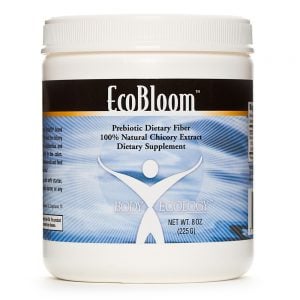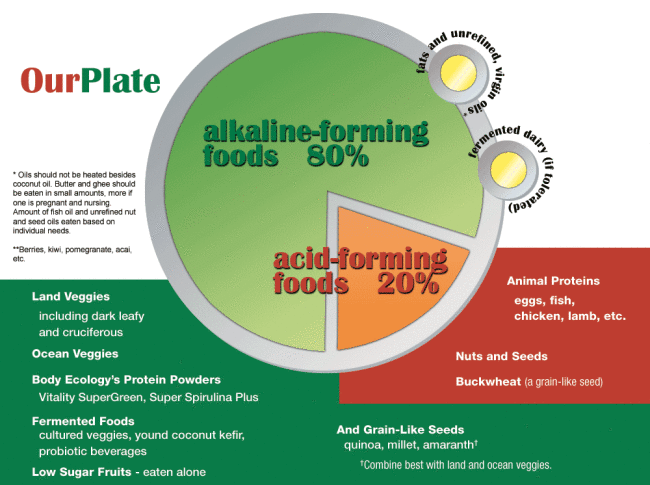Can This Food Help Control Blood Sugar and Keep You Lean?
Your digestive tract isn’t just a place where you break down and pull nutrients from food. It is so much more than that.
For example, the gut, the liver, and the brain are talking to each other all of the time. What they say—the biochemical signals that they send—broadly affects the body. Some of the conversations between the brain and the gut can influence things like blood sugar, type 2 diabetes, and weight gain.
These metabolic disorders have nothing to do with the outdated belief that calories matter. Instead, we now know that the quality of the food that we eat matters.
Fiber for Weight Loss: Understanding Your Gut Bacteria

Fiber is a prebiotic that feeds good gut bacteria to influence metabolism. You can increase your fiber to encourage weight loss by eating a probiotic diet and by taking a prebiotic fiber supplement, like EcoBloom.
Living within the digestive tract are trillions of microbes. One thing these microbes do is help you break down the food that you eat. They are particularly fond of fiber, which acts as a prebiotic in the digestive tract.
A prebiotic feeds good gut bacteria.
Many foods are high in fiber and naturally nourish the microbes living in your gut. Legumes—or beans—are a particularly rich source of dietary fiber. Dark, green, leafy vegetables; cruciferous vegetables; starchy vegetables; and grain-like seeds are all high in fiber.
The Body Ecology Diet is mostly a plant-based diet, with over 80% of our nutrients coming from plant foods. This is because the Body Ecology Diet focuses on healing the gut and restoring the inner ecosystem—which means feeding fiber-rich foods to the good bacteria in the digestive tract.
When good bacteria feast on fiber-rich foods, they produce special fatty acids that soothe intestinal inflammation, healing a leaky gut. (1)
The fatty acids that gut bacteria make within the intestinal tract also activate a pathway to the brain. This pathway between the gut and the brain influences your metabolism.
How Gut Bacteria Help You Regulate Blood Sugar
Did you know that your body can make sugar—or glucose—from non-carbs, like fat or protein? Scientists have come up with a name for this mechanism. It’s called gluconeogenesis. That might seem like a long, convoluted word, but really it tells us exactly what’s going on.
Gluco means sugar. Neo means new. And genesis means creation.
Gluco-neo-genesis happens mostly in the liver. But in recent years, researchers have found that it also takes place in the digestive tract.
This is called intestinal gluco-neo-genesis. Researchers have found that intestinal gluconeogenesis plays a very important role in metabolic disease. (2) Because gluconeogenesis involves the creation of sugar, it can prevent blood sugar from dropping too low.
The benefits of healthy intestinal gluconeogenesis include:
- Reduced body weight
- Reduced fat
- Better control of blood sugar
- Improved insulin sensitivity
The fatty acids that beneficial bacteria manufacture actually trigger intestinal gluconeogenesis. (3)
Without healthy gut bacteria, gluconeogenesis doesn’t happen at a healthy rate. Likewise, without a regular supply of fiber-rich foods to feed good gut bacteria, fatty acids aren’t as plentiful—this throws a wrench in gluconeogenesis.
80/20: The Body Ecology Way
The Body Ecology Diet recommends that at least 80% of your plate is made up of non-starchy vegetables, leafy greens, ocean vegetables, and cultured, probiotic foods. The remaining 20% can contain animal protein—OR—grain-like seeds and starchy vegetables, both of which are high in dietary fiber.
The reason why the Body Ecology Diet emphasizes plant foods and includes grain-like seeds, such as millet, buckwheat, amaranth, and quinoa, is because we know that these foods work synergistically with healthy gut bacteria.
If you want to lose weight or manage blood sugar, take a closer look at your inner ecosystem!
You can get metabolically healthy by transitioning to a probiotic diet that emphasizes fiber-rich foods, nourishing a healthy inner ecosystem and a healthy you. Fermented foods like cultured vegetables and coconut water kefir are the best sources of living probiotics to rebuild and replenish a healthy inner ecology.
What To Remember Most About This Article:
The quality of the food you eat matters much more than the amount of calories you take in. It’s interesting to learn that there are millions of microbes in the digestive tract that help you break down food. These microbes particularly like to feed on fiber, a prebiotic in the gut. Fiber as a prebiotic nourishes friendly gut bacteria.
When good bacteria feed on foods rich in fiber, they produce special fatty acids to soothe a leaky gut. These fatty acids activate a pathway to the brain and influence metabolism. Fatty acids produced by beneficial bacteria can also trigger a process called intestinal gluconeogenesis to reduce body weight, reduce fat, balance blood sugar, and improve insulin sensitivity. Ample amounts of fiber are essential for this to take place.
The Body Ecology Diet makes it simple by recommending 80% ocean vegetables, cultured foods, leafy greens, and non-starchy vegetables at every meal. You can easily lose weight and balance blood sugar by supporting your inner ecosystem with fermented foods like cultured vegetables and coconut water kefir!
- [product id=”1″]
- [product id=”2″]
- [product id=”3″]
- [product id=”22″]
REFERENCES:
- Tedelind, S., Westberg, F., Kjerrulf, M., & Vidal, A. (2007). Anti-inflammatory properties of the short-chain fatty acids acetate and propionate: a study with relevance to inflammatory bowel disease. World Journal of Gastroenterology, 13(20), 2826.
- Mithieux, G., Andreelli, F., & Magnan, C. (2009). Intestinal gluconeogenesis: key signal of central control of energy and glucose homeostasis. Current Opinion in Clinical Nutrition & Metabolic Care, 12(4), 419-423.
- De Vadder, F., Kovatcheva-Datchary, P., Goncalves, D., Vinera, J., Zitoun, C., Duchampt, A., … & Mithieux, G. (2014). Microbiota-Generated Metabolites Promote Metabolic Benefits via Gut-Brain Neural Circuits. Cell.









